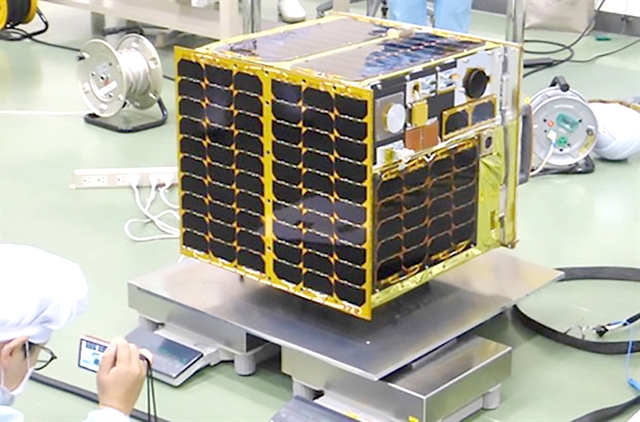 Society
Society

 |
| The MicroDragon satellite is weighed by scientists. — Photo from Japan Aerospace Exploration Agency (JAXA) |
HÀ NỘI — Việt Nam, a newcomer in the space odyssey, began manufacturing small satellites in 2007 and gained certain achievements.
Phạm Anh Tuấn, Director General of the Việt Nam National Space Centre (VNSC) under the Việt Nam Academy of Science and Technology, said aware of its limited economic and science-technology capability, Việt Nam has chosen to focus on small satellite manufacturing and imagery.
Việt Nam is among the countries most vulnerable to climate change, with a loss of about 1 per cent of GDP every year. Satellite imagery can help deliver better flooding and storm forecasts, which contribute to the reduction of human losses and at least 10 per cent of economic damage.
In addition, earth observation satellites also aid monitoring of agriculture, resources, water flow, maritime areas, and territorial planning, especially in the field of national security and defence, Tuấn noted.
After years of study and manufacturing, and with the support of the Japan Aerospace Exploration Agency (JAXA), Vietnamese engineers successfully made a micro satellite.
The 1kg PicoDragon, the first homemade satellite, was launched successfully into space on November 19, 2013, and remained in orbit for three months.
Later, 36 engineers of the VNSC were sent to five leading universities of Japan for space technology courses. Under the instruction of Japanese professors, they designed and manufactured another satellite.
The 50kg MicroDragon was launched on an Epsilon 4 rocket from the Uchinoura Space Centre in Japan’s Kagoshima prefecture, on January 18, 2019. It also successfully transmitted signals to earth.
Two years later, NanoDragon, a nano-layer cubesat weighing about four kilograms made up of multiple small modules, was sent into space.
NanoDragon’s research, design, and integration was conducted completely in Việt Nam by VNSC scientists. It seeks to demonstrate micro-satellite beam technology to receive automatic identification system (AIS) signals to monitor activities at sea.
Dr. Lê Xuân Huy, Deputy General Director of VNSC, also a member of the research team, said that in the making of NanoDragon, the team encountered many difficulties because the product was developed on a limited infrastructure, technological equipment for satellite development is still modest, while a supporting industry in space has not yet developed.
The purchase of high-tech equipment to Việt Nam must go through complicated export procedures due to the ITAR Regulation (International Traffic in Arms Regulations), leading to difficulties in procurement, even making some impossible to buy.
To overcome these difficulties, the research team tried to find various suppliers to obtain the most suitable products in terms of price, technology, and fewer ITAR constraints.
The research team also coordinated with domestic companies to manufacture products, directly to the factory with processing workers to ensure quality requirements and to save costs, Dr Huy said.
Việt Nam's strategy for the development and application of space science and technology by 2030 has set a major goal of mastering the technology of making small satellites towards self-producing such satellites.
To realise such a goal, Tuấn stressed the important role of the Prime Minister in directing and coordinating ministries and agencies in this field.
Special management mechanisms are needed to facilitate space technology projects, he said, adding that the domestic manufacturing of satellites also requires long-term investment.
Tuấn suggested Việt Nam soon join the UN treaties on the peaceful uses of outer space, and work to protect national interests in space, together with land, air, sea and cyberspace.
Bùi Trọng Tuyên, Director of the Space Technology Institute, stressed that to develop space technology, Việt Nam needs to diversify resources, suggesting the State offer tax incentives to encourage businesses to join the field.
Tuyên remarked that it's important to have a vision in this field and accepted that initially there would be no point in expecting profits. — VNS




